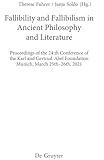Fallibility and Fallibilism in Ancient Philosophy and Literature / ed. by Therese Fuhrer, Janja Soldo.
Material type: TextSeries: Philosophie der Antike : Veröffentlichungen der Karl- und Gertrud-Abel-Stiftung ; 45Publisher: Berlin ; Boston : De Gruyter, [2023]Copyright date: ©2024Description: 1 online resource (X, 358 p.)Content type:
TextSeries: Philosophie der Antike : Veröffentlichungen der Karl- und Gertrud-Abel-Stiftung ; 45Publisher: Berlin ; Boston : De Gruyter, [2023]Copyright date: ©2024Description: 1 online resource (X, 358 p.)Content type: - 9783111314358
- 9783111317144
- 9783111316802
- online - DeGruyter
- Issued also in print.
| Item type | Current library | Call number | URL | Status | Notes | Barcode | |
|---|---|---|---|---|---|---|---|
 eBook
eBook
|
Biblioteca "Angelicum" Pont. Univ. S.Tommaso d'Aquino Nuvola online | online - DeGruyter (Browse shelf(Opens below)) | Online access | Not for loan (Accesso limitato) | Accesso per gli utenti autorizzati / Access for authorized users | (dgr)9783111316802 |
Frontmatter -- Contents -- Introduction -- Aetiologies of Failure. Ancient Justification Narratives of Human Fallibility -- The Stoics on how vice and error make life worth living -- Navigating Cognitive Success (and Failure): Cicero, Lucullus 66 -- Epicureans dealing with the unthinkability of death -- Letters from an invalid philosopher: the fallibility of mind and body in Seneca’s Epistulae morales -- Vom Gelingen und Scheitern eines Philosophie-Kurses: Senecas Luciliusbriefe als Distance Learning -- The Stoic Sage and the Tragic Monster in Seneca -- Die Funktionalisierung der Fallibilität des Naso exul poeta et patiens in Ov. Pont. 3,1 -- A workaholic on holiday: Marcus Aurelius’ fallibility in Fronto, De Feriis Alsiensibus 3 -- Ethische und ästhetische Konsequenzen scheiternder Erkenntnis in Lukians Hermotimus -- Plotinus on Fallibility and Infallibility -- Fragility in the Encounter with the Divine: from Plato to Gregory of Nyssa and Augustine -- Origenes über menschliches Fehlverhalten -- Fallibilität im Prozess der Textüberlieferung: Der Typus des ‚schläfrigen Schreibers‘ von Hieronymus bis Housman -- Notes on Contributors -- Index locorum -- Index nominum et rerum
restricted access online access with authorization star
http://purl.org/coar/access_right/c_16ec
Mankind’s constant struggle with physical as well as mental weaknesses is omnipresent in ancient literature: misconduct, wrongdoing, failure and experiences of contingency are anthropological phenomena. Ancient ethics, epistemology, and natural philosophy have developed different theoretical approaches and guidelines on how to act and how to overcome all kinds of problems. Christian theology, on the other hand, has explained moral failure as a symptom of original sin, comparing decline and destruction to a burden from which mankind is relieved only at the end. The contributions explore how ancient philosophical texts, both pagan and Christian, explain, conceptualize and integrate the myriad manifestations of human fallibility into the different philosophical schools. The focus is on anthropological, ontological and theological concepts that analyse and reflect human fallibility, as well as on the textual and linguistic representation of the phenomenon in ancient literature. Several contributions in the volume explore literary texts that discuss or illustrate the philosophical dimension of fallibility, such as satire’s or tragedy’s (often exaggerated) depiction of human weakness.
Issued also in print.
Mode of access: Internet via World Wide Web.
In English.
Description based on online resource; title from PDF title page (publisher's Web site, viewed 06. Mrz 2024)


